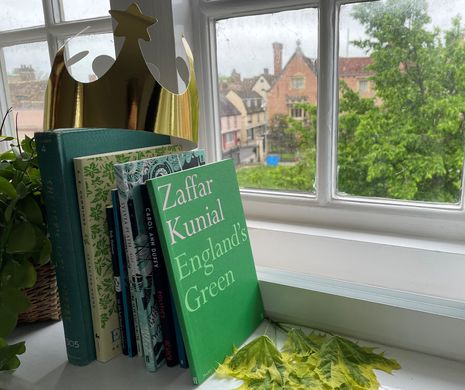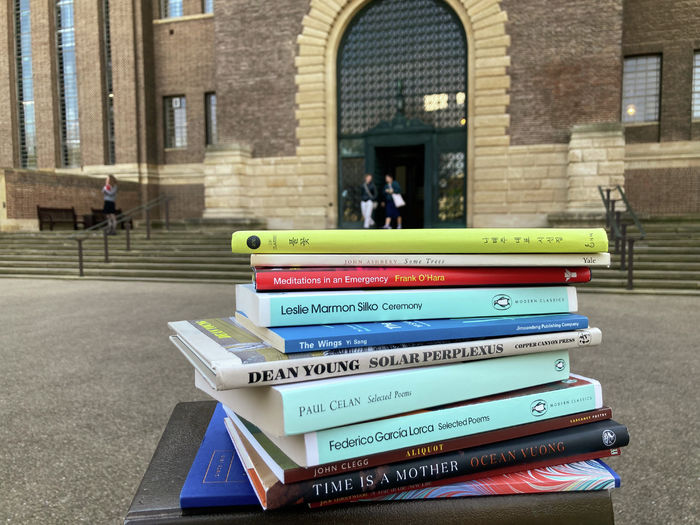Poetry perspectives: a different kind of patriotism
Has the last week left you feeling swarmed by cardboard crowns and British flags? Ahana Banerji offers some respite from the endless patriotism with an array of unique poetic perspectives on crown and country.

Looking through shop windows these past few weeks has been strange. A lot of red, white, blue, and promises of products that are “fit for a king”. I spent the morning of the Coronation feeling sorry for Simon Armitage who, as poet laureate, is obliged to write about the new king. Then, having read his poem 'An Unexpected Guest’, I remembered that Armitage is something of a royalist, and felt decidedly less sorry for him altogether.
Patriotism is a weird thing. I didn’t identify with Armitage’s poem at all, a narrative which follows a commoner, such as you or me, (ha!) who is invited to the Coronation and “adorn[s] the day with ordinariness” next to the “extraordinary” royals. Armitage’s poem is patronising. It irked me. So I decided to compile some poems that muse on Britain in a way that I can relate to - whether that’s by political scrutiny, praising natural landscapes, or simply finding peace in the little grooves of life.
‘Here We Are’ by Wendy Cope
In classic Wendy Cope style, this poem is a gentle reflection on grounding yourself in life’s busy moments. As is classic of Cope, the tone of this poem is quintessentially English, and finds comfort in a “small, chosen city” at the odds of global expansion.
‘They Work’ by Rabindranath Tagore
Rabindranath Tagore was a Bengali poet and polymath whose admirers included William Butler Yeats and Ezra Pound. Giving voice to the growing anti-Empire movements in India in the early 20th century, Tagore renounced his knighthood following the massacre at Jallianwala Bagh in 1919. His poem ‘They Work’ is lyrically dense and flowing. He writes: “I know that the flow of time will sweep away their empire’s enveloping nets, / and the armies, bearers of its burden, will leave not a trace in the path of the stars.”
'Ode to England' by Daljit Nagra
Focusing on modern-day Britain, Daljit Nagra’s latest collection, British Museum marks a shift in the poet’s previous heavy use of “Punglish” (Punjabi-English). The tone for this collection is nonetheless energetic, as Nagra fondly remembers England’s “golden days” - not of Empire, but of “Lipton’s; the lanes wafting Yorkshire puds / with gravy that called home Brownies and Cubs.”
‘Foxglove Country’ by Zaffar Kunial
England’s Green is one of the strongest contemporary poetry collections I’ve ever read. Centring on his home in Hebden Bridge, West Yorkshire, the poems in Zaffar Kunial’s collection are part origin stories, part odes to England’s landscapes. ‘Foxglove Country’ is a heart wrenching poem; the speaker meditates on “the little Englands of my grief”, examining the complexities of communication, love, location, and absence.
‘On the Welsh Language’ by Katherine Philips
Oh Katherine Philips, my beloved. With an understated linguistic style typical of her work, you can't help but come away from ‘On the Welsh Language’ with a sense of her power as an individual and poet. By drawing on classical touchstones, the poem shows her love for the Welsh language and proudly displays its cultural dexterity.
‘England in 1819’ by Percy Bysshe Shelley
This is a sonnet, written not quite out of love – or maybe some sort of tough love – in which Shelley describes the reality of living in England in 1919. Attached in the postscript of a letter to Leigh Hunt, Shelley wrote, “I do not expect you to publish it, but you may show it to whom you please.” This poem is writhingly scathing, criticising “Rulers who neither see nor feel nor know, / But leechlike to their fainting country cling” yet ends on a note of wary optimism for a “glorious Phantom may / Burst, to illumine our tempestuous day.”
 Comment / Cambridge is right to scrap its state school target1 May 2024
Comment / Cambridge is right to scrap its state school target1 May 2024 News / Academics call for Cambridge to drop investigation into ‘race realist’ fellow2 May 2024
News / Academics call for Cambridge to drop investigation into ‘race realist’ fellow2 May 2024 News / Gender attainment gap to be excluded from Cambridge access report3 May 2024
News / Gender attainment gap to be excluded from Cambridge access report3 May 2024 News / Cambridge postgrad re-elected as City councillor4 May 2024
News / Cambridge postgrad re-elected as City councillor4 May 2024 Comment / Accepting black people into Cambridge is not an act of discrimination3 May 2024
Comment / Accepting black people into Cambridge is not an act of discrimination3 May 2024





